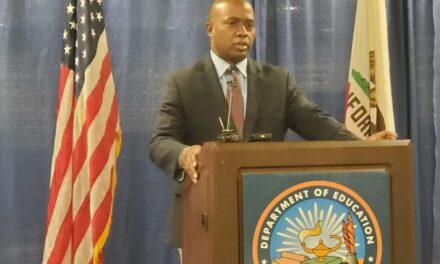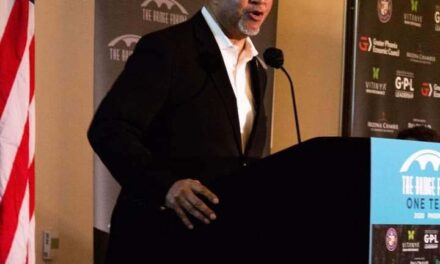Challenges Remain for California Black Families with Autistic Loved Ones
Prejudice, loneliness, isolation, rejection by their peers, high rates of bullying, low social integration and learning difficulties are just some of the negative experiences autistic people live through every day, researchers who study autism spectrum disorder (ASD) report.

Jaivon Grant | California Black Media
Prejudice, loneliness, isolation, rejection by their peers, high rates of bullying, low social integration and learning difficulties are just some of the negative experiences autistic people live through every day, researchers who study autism spectrum disorder (ASD) report.
Earlier this year, the Centers for Disease Control and Prevention (CDC) reported that the rate of ASD occurrence is increasing among African Americans across the country—and here in California, too. ASD advocates say those findings are alarming because Black families have historically been excluded, overlooked and under-informed when it comes to receiving resources and services for their loved ones living with the condition.
Janet Jones-Jordan, Senior Director of Community Inclusion for Autism Speaks says that although ASD affects people of all races and ethnicities, there are disparities that make it difficult for Black families—especially those who may be low-resourced or underserved—to have access to care and equity of resources.
“The cost of diagnostic tests for autism can be an issue because they cost $4,000 to $6,000, and most private facilities to not accept insurance for those initial tests,” says Jones-Jordan. “Food insecurity can also be a barrier because if families are more concerned about their housing needs and how they’re doing to feed their families, healthcare may be delayed to ensure other pertinent needs are addressed.”
Autism Speaks has an Autism Response Team that comprises a trained team of individuals who provide information, referrals and access to no-cost resources and tools for all autism-related needs.
According to the latest analysis from the CDC, one in every 36 eight-year-old children in the United States has been diagnosed with ASD. While all previous CDC reports show higher rates of ASD in White children compared to Black or Hispanic children, the latest report shows the opposite. This is the first year that overall rates of ASD were consistently higher among Black (2.9%), Hispanic (3.2%) and Asian or Pacific Islander (3.3%) children compared to white (2.4%) children.”
According to the Autism Developmental Disabilities Monitoring Network, 1 in 22 (4.5%) children in California are diagnosed with autism. That number is significantly higher—almost double—than those stated in a December report, which stated 1 in 44 Golden State children are autistic.
April is Autism Acceptance Month (AAM). During AAM, especially on World Autism Day on April 2, individuals and organizations around the world educate the public about autism spectrum disorder (ASD) and the stigma people living with the neurodevelopmental condition and their families face. ASD is a disability that can inhibit social interactions and make learning difficult, depending on the severity of the autism.
Advocates hope increased awareness will help the people across the world become more sensitive, inclusive and empathetic to autistic people and the myriad challenges they and their loved ones navigate each day.
The Autism Society declared the first National Autism Awareness month in 1970. Over the last five decades, advocates have organized fundraisers, walks, public forums and social media conversations to raise public awareness around the neurodevelopmental condition.
Although there are other programs across California (and the United States) that try assisting in the de-stigmatization autism diagnosis among minority communities, rates among Black Californians are becoming alarmingly worse.
Areva Martin, an award-winning civil rights attorney and special-needs advocate, says that it is common for African American families to struggle getting accurate diagnoses or early intervention for their children’s ASD.
“The awareness of the racial disparities in families with autistic spectrum disorder is becoming more,” says Martin. “But I would not say that we have seen a vast improvement across the board in the way that African American children are provided a diagnosis, let alone early interventions.”
Martin pointed out that Black families must often hire private attorneys to help them navigate through the services that are supposed to be freely provided to families who have autistic members.
“I have seen and heard many parents with horror stories about trying to access free public services through their children’s schools, but it is a hassle for them because the process can be too bureaucratic,” added Martin.
Black families, historically, have faced numerous obstacles to accessing resources that are easily available to others. This difficulty can be attributed to numerous factors, such as a bias against helping the Black community, challenging environmental circumstances, or needlessly complicated processes that can prove overwhelming for those who are unaware of where to turn. This suggests there is an even larger number of Black individuals who have not been diagnosed and/or have never received the necessary services to thrive going forward.
If experts and practitioners agree that an earlier diagnosis leads to more effective interventions, then the process to receiving that diagnosis should not be tedious and discouraging. It is undeniable that when it comes to autism in the Black community, more can be done—and it can be done better.
“It’s a fact that more work needs to be done and researchers will need to create better pipelines to gather the data to create sustainable change within the community,” said Jones-Jordan.
This California Black Media report was supported in whole or in part by funding provided by the State of California, administered by the California State Library.













